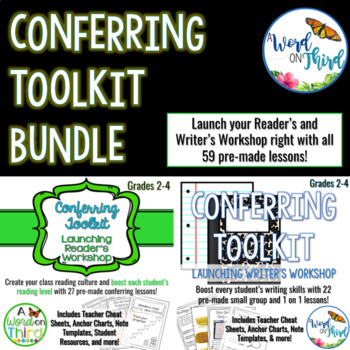How often do you feel like you’re interrupted when you
confer? How often do you notice that your students start to get off task--even
if they AREN’T distracting others--when you’re teaching small groups?
This is going to
happen from time to time, but these tips can help you minimize off-task
behavior and maximize learning when you confer.
1. Walk around the room before conferring.
Make sure everyone is settled and working independently
before pulling your small groups. Your proximity here is important. It's OK if it takes a few minutes.
2. Hold small group instruction in a place that allows you to see the whole room.
This is important for you and for students. When students
know they can be seen, they are less likely to get distracted. It’s not that
students want to misbehave or not learn—it’s just a simple fact of human
nature! Don’t you focus less when you sit in the back of your faculty meetings?
I know I do!! Use eye contact to your advantage when your students need it.
3. Walk around the room while conferring.
This might mean doing a quick walk-around between each small
group lesson or, if your class is having a rough time, it might even be a quick
walk-around during the active engagement portion of your lesson.
You
still need to be present and coaching during the active engagement, but just 10 or 20 seconds of walking around can make a big difference.
4. Teach behavioral expectations.
If a student isn’t on task when you meet with small groups,
it’s possible because they need to be taught how to meet your expectations.
Every teacher has different expectations, and we all respond to off-task
behaviors differently too! Set your students up for success by teaching them
what to do.
5. Get some movement into your workshop period.
When stamina starts to get low, I stop my workshop period
all together. You might do a quick brain break or use a mid-workshop
interruption.
Mid-workshop interruptions are your friend. You might pull the
students to the carpet or whole group teaching area, quickly teach them
something (I’m talking a 1 minute think-aloud or 3 minutes of highlighting a skill in a mentor text), and then send them back to work independently.
Those
few minutes makes a huge difference. People need breaks.
6. Move students’ seats if they need more support.
Whether your student is prone distracting the class or simply
prone to quietly producing less work, move his or her seat to be in a more
productive spot. It doesn’t need to be permanent.
I often had my reluctant writers write right next to me or
just a little bit to the side of me while I was conferring or working in a
small group. If they overhear your lesson, it won’t hurt them. In fact, it may
arm them with more strategies to use when they are working. Then, when your
students in the small group are working on the active engagement portion of the
lesson, you can check in and see how things are going with your reluctant
writer.
7. Use timers for students who need it.
I really like time timers because they show the passing of
time without counting down the seconds, which can be really distracting. You
can read a blog post I wrote all about this HERE.
8. Have a your small group materials and lessons ready before teaching.
Have a toolkit created with all of the materials you'll need for your small group lessons. When your materials are all ready ahead of time, you won't need to do the heavy lifting of creating small group lessons during your actual workshop period. This will allow you to be more mentally present with your class since you won't have to focus on lesson planning.
Toolkits take a lot of time to make, but they are
totally worth it! I urge you to make one. Every time you teach a small group
lesson, save the resources you use for it! You'll use them again in another day, week, month, or year, I promise!!!
If you don’t want to spend time making one, you can download my toolkit
bundle for launching reader’s and writer’s workshop! Grab both toolkits for a
discounted price by clicking HERE or on the picture below. These toolkits
highlights important reading and writing behaviors and partnership skills to
make classroom management easier for you during your literacy blocks!
How do you hold down the fort when you confer? Are there any
classroom management issues that you experience make you want to pull your hair out? We've all been there! Comment
below!!
By the way, if you haven't already subscribed, we'd love to have you! Join our community by signing up in the box right under my bio to the right. That way, you won't miss any blog posts. I promise not to clutter your inbox! And make sure to follow me on Instagram for more classroom inspiration.



No comments
Post a Comment